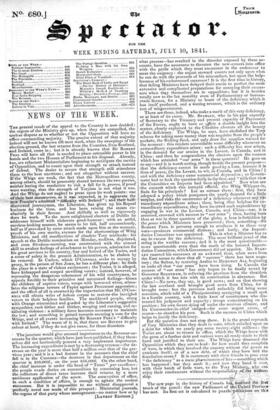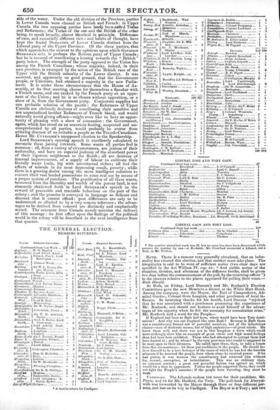The new page in the history of Canada h wed
the first touch of the pencil: the new Parliament of iced Province has met. Its first act is calculated to puzzle ians on this
side of the water. Under the old division of the Province, parties in Lower Canada were classed as British and French : in Upper Canada the two opposing parties have late* been called Tsaties and Reformers; the Tories of the one and the British of the other being, to speak broadly, almost identical in principle. Difference of race, and essentially different views and habits of thought, have kept the feudal Democrats of Lower Canada distinct from the Liberal party of the Upper Province. Of the three parties, that which approaches the nearest to the opinions upon which Governor SYDENHAM acts, is perhaps the Reform party of Upper Canada; but he is accused of manifesting a leaning towards the " British" party below. The strength of the party opposed to the Union lies among the French Canadians; whose majority, indeed, in their own province, is swamped by the union of the British race of the Upper with the British minority of the Lower district. It was asserted, and apparently on good ground, that the Government people, or Unionists, had obtained a majority in the new Parlia- ment. It is under these circumstances that the House of As- sembly, at its first meeting, choose for themselves a Speaker with a French name, and one ranked by the French party as an oppo- nent of the Union; he is so chosen without opposition, or a show of it, from te Government party. Conjecture supplies but one probable solution of the puzzle : the Reformers of Upper Canada are obviously desirous of conciliating their sensitive and not unprejudiced brother Reformers of French blood, and would naturally avoid giving offence—might even like to have an oppor- tunity of pleasing with a show of concession : the Government, again, which has stood on an uncertain footing, suspected and un- comprehended by all parties, would probably be averse from evincing distrust of so irritable a people as the French-Canadians. Hence Mr. Cnvillasa's unopposed election to the Speakership. Lord SYDENHAM'S opening speech is excellently calculated to reconcile these jarring interests. Some wants all parties feel in common : all, from a variety of circumstances, are jealous of their nationality, and have an especial jealousy of the absorbent power of their vigorous neighbours to the South; all are desirous of internal improvements, of a supply of labour to cultivate their literally waste lands, big with unextracted riches; all feel the effects of misrule in its most depressing result, poverty ; while there is a growing desire among the more intelligent colonists to convert their vast landed possessions to some real use by means of a proper system of purchase. The gratification of all these wants, bestowed from the liberality and wealth of the parent land, is not obscurely shadowed forth in Lord SYDEINHAM t3 speech as the reward of peaceable and tractable behaviour on the part of the colony ; and the promise is conveyed in language so delicate and discreet that it cannot offend : past differences are only to be understood as alluded to by a very remote inference ; the advan- tages to be derived from concord are distinctly and emphatically stated. The accounts from Canada merely mention the delivery of this message : its first effect upon the feelings of the political world in the colony will be described in the next intelligence from that quarter.



























